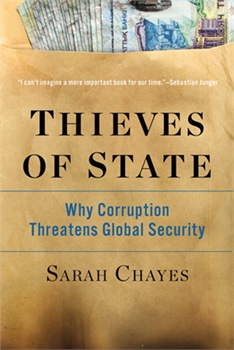Description
A former adviser to the Joint Chiefs of Staff explains how government’s oldest problem is its greatest destabilizing force. The world is blowing up. Every day a new blaze seems to ignite: the bloody implosion of Iraq and Syria; the East-West standoff in Ukraine; abducted schoolgirls in northern Nigeria. Is there some thread tying these frightening international security crises together? In a riveting account that weaves history with fast-moving reportage and insider accounts from the Afghanistan war, Sarah Chayes identifies the unexpected link: corruption. Since the late 1990s, corruption has reached such an extent that some governments resemble glorified criminal gangs, bent solely on their own enrichment. These kleptocrats drive indignant populations to extremes—ranging from revolution to militant puritanical religion. Chayes plunges readers into some of the most venal environments on earth and examines what emerges: Afghans returning to the Taliban, Egyptians overthrowing the Mubarak government (but also redesigning Al-Qaeda), and Nigerians embracing both radical evangelical Christianity and the Islamist terror group Boko Haram. In many such places, rigid moral codes are put forth as an antidote to the collapse of public integrity. The pattern, moreover, pervades history. Through deep archival research, Chayes reveals that canonical political thinkers such as John Locke and Machiavelli, as well as the great medieval Islamic statesman Nizam al-Mulk, all named corruption as a threat to the realm. In a thrilling argument connecting the Protestant Reformation to the Arab Spring, Thieves of State presents a powerful new way to understand global extremism. And it makes a compelling case that we must confront corruption, for it is a cause—not a result—of global instability.
About the Author
Sarah Chayes is a former senior associate in the Democracy and Rule of Law Program at the Carnegie Endowment for International Peace and former award-winning reporter for National Public Radio, she also served as special advisor to the Chairman of the Joint Chiefs of Staff.She graduated from Phillips Academy, Andover (1980) and Harvard University (1984) with a degree in History, magna cum laude. She was awarded the Radcliffe College History Prize. She then served in the Peace Corps in Morocco, returning to Harvard to earn a master's degree in History, specializing in the Medieval Islamic period. Besides English, she speaks Pashto, French, and Arabic.From 1996 to 2002, she served as Paris reporter for National Public Radio, covering France, the European Union, North Africa, and the Balkans. She earned 1999 Foreign Press Club and Sigma Delta Chi awards (together with other members of the NPR team) for her reporting on the Kosovo War. After covering the fall of the Taliban and the early weeks of post-Taliban Afghanistan, in 2002 Chayes decided to leave reporting and stay behind to try to contribute to the rebuilding of the war-torn country.Chayes lived in Kandahar, Afghanistan from 2002 to 2009. Having learned to speak Pashto, she helped rebuild homes and set up a dairy cooperative. In May 2005, she established the Arghand Cooperative, a venture that encourages local Afghan farmers to produce flowers, fruits, and herbs instead of opium poppies. The cooperative buys their almonds, pomegranate seeds, cumin and anise and artemisia and root dyes, extracts oils, essential oils, and tinctures from them, with which it produces soaps and other scented products for export. The cooperative is an associate member of the Natural Perfumers Guild.Since leaving full-time radio reporting, she has been a frequent contributor to the print media, contributing to Foreign Policy Magazine, the Los Angeles Times, The Atlantic, and the Washington Post, among other outlets. Carnegie Endowment for International Peace maintains an archive of her writings.
